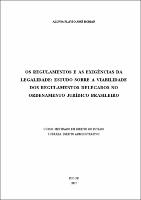Use este identificador para citar ou linkar para este item:
https://repositorio.pucsp.br/jspui/handle/handle/7459| Tipo: | Dissertação |
| Título: | Os regulamentos e as exigências da legalidade: estudo sobre a viabilidade dos regulamentos delegados no ordenamento jurídico brasileiro |
| Autor(es): | Roman, Flavio José |
| Primeiro Orientador: | Rocha, Silvio Luís Ferreira da |
| Resumo: | Esta dissertação analisa a viabilidade, no ordenamento jurídico-constitucional brasileiro, dos chamados regulamentos delegados, autorizados ou habilitados. Procura também definir os limites do exercício da função regulamentar pela Administração Pública. Sobre o tema, a primeira preocupação foi definir um dever mínimo de regulamentação do legislador sobre a matéria, uma área onde o Parlamento, em hipótese nenhuma, seria livre para entregar a questão à discricionariedade da Administração. Foi a partir dessa compreensão que se desenvolveu o tema dos regulamentos habilitados, que se justificariam como um tipo de regulamento executivo, eis que os padrões de regulamentação já foram previamente definidos pela lei habilitante. Cuida-se, pois, de uma tentativa de conciliação entre regulamento habilitado e Estado de Direito. Assim, na primeira parte, debate-se sobre os princípios da separação de poderes e da legalidade e se procura já alinhar os argumentos sobre os limites da função regulamentar. Já numa segunda parte, cuida-se de diferenciar o regulamento da lei e do ato administrativo em sentido estrito. Em seguida, apresenta-se o conceito de regulamento, bem como sua fundamentação, classificação e tipologia. Mais a frente, discute-se a viabilidade de um regulamento habilitado, mas que não deixe de ser um tipo especial de regulamento executivo porque deve atender às exigências da legalidade. Enfim, são indicados os limites substanciais à função regulamentar, ou seja, os deveres do legislador. Não se trata, portanto, de uma análise acerca da viabilidade de um tipo abstrato de regulamento para apurar se ele se ajusta ao ordenamento jurídico-constitucional em estudo, mas de compreender o regulamento a partir de determinadas exigências de densidade normativa da lei. É que a partir da definição de deveres mínimos da legislação habilitante, todo regulamento posterior, editado com fundamento nela, poderá ser considerado, de certo modo, como uma modalidade executiva da lei, não ofensiva, pois, aos princípios do Estado de Direito |
| Abstract: | This research analyzes the possibilities of delegated regulations in the Brazilian legal-constitutional order, and looks for the definition of the limits of the ruling function by the Public Administration. The first concern was to define the legislator's minimum duty on regulating the subject, decisions which the Parliament could never entirely assign to the Administration's discretion. The delegated regulations theory was developed from this understanding, as a type of executive regulation, considering that the delegating law had been already defined by regulation standards. It is, therefore, an attempt of conciliation between delegated regulations and Rule of law. Thus, in the first part of the text, the separation of powers and the legality are covered, in an attempt to line up the limits of ruling function. In the second part, the differences between regulation and law are explained, and also the differences between regulation and administrative act in strict sense. After that, the regulation's concept is presented, as well its justification, classification and typology. Subsequently, it is argued the existence of delegated regulation as an especial type of executive regulation, once it must respect the legal standards. At last, the substantial limits to the ruling function and are indicated, i.e. the duties of the legislator. It was not intended the analysis of the viability of the abstract type of regulation to find out whether the regulation is adjusted to the legal-constitutional order. On the contrary, the study tries to understand the regulation from the perspective of the requirements of the law. From the definition of minimum duties of the delegating law, all subsequent regulation would be considered, in certain way, as an executive modality of the law, not offensive, therefore, to the principles of the Rule of law |
| Palavras-chave: | Regulamentos delegados Delegated regulations Brasil -- Direito constitucional Direito administrativo -- Brasil Estado de direito |
| CNPq: | CNPQ::CIENCIAS SOCIAIS APLICADAS::DIREITO |
| Idioma: | por |
| País: | BR |
| Editor: | Pontifícia Universidade Católica de São Paulo |
| Sigla da Instituição: | PUC-SP |
| metadata.dc.publisher.department: | Faculdade de Direito |
| metadata.dc.publisher.program: | Programa de Estudos Pós-Graduados em Direito |
| Citação: | Roman, Flavio José. Os regulamentos e as exigências da legalidade: estudo sobre a viabilidade dos regulamentos delegados no ordenamento jurídico brasileiro. 2007. 239 f. Dissertação (Mestrado em Direito) - Pontifícia Universidade Católica de São Paulo, São Paulo, 2007. |
| Tipo de Acesso: | Acesso Aberto |
| URI: | https://tede2.pucsp.br/handle/handle/7459 |
| Data do documento: | 4-Mai-2007 |
| Aparece nas coleções: | Programa de Pós-Graduação em Direito |
Arquivos associados a este item:
| Arquivo | Descrição | Tamanho | Formato | |
|---|---|---|---|---|
| Flavio J Roman.pdf | 1,38 MB | Adobe PDF |  Visualizar/Abrir |
Os itens no repositório estão protegidos por copyright, com todos os direitos reservados, salvo quando é indicado o contrário.
